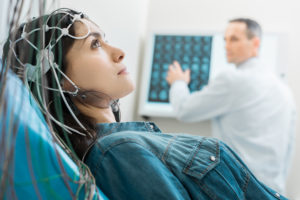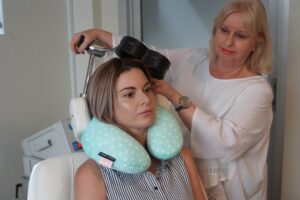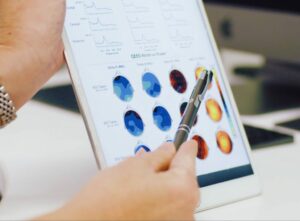Advanced PTSD Treatment Can Help You Move Past The Trauma For Good
A new, non-invasive, drug-free treatment for PTSD is now available at BrainCare Performance Center in Orlando, FL.

PTSD Treatment: “Nothing short of a miracle.”
Scot’s PTSD made him think he was going crazy. And people around him thought so, too. They didn’t understand why he’d be okay one minute and out of control the next. They didn’t want to be around him for fear of what he might do. He didn’t blame them—because he didn’t understand it himself. A retired Army Delta Force operator, Scot had been in some terrifying situations. But nothing felt as terrifying to him as not knowing what was wrong with him, or how to fix it. He tried everything, from traditional medicine to psychotherapy to hyperbaric chambers. But nothing made him feel any better. Then Scot heard about the Brain Treatment Center. He figured he had nothing to lose. And just two months after treatment, he felt like he had a whole new brain. “I consider the healing I experienced to be nothing short of a miracle,” he said. PTSD doesn’t just affect those who have served in the military; it can affect anyone. And it can be debilitating. According to the American Psychiatric Association, PTSD affects around 3.5 percent of US adults every year. And an estimated one in 11 people will be diagnosed with PTSD in their lifetime. But there is hope. It’s called MeRT or Magnetic e-Resonance Therapy. It’s non-invasive, drug-free, and lasting. And it’s had some spectacular results when treating PTSD.* * Results are based on active and strict observation of our regimens. Results may vary based on the individual user and are not guaranteed.
The MeRTsm Approach to PTSD Treatment
 MeRT, or Magnetic e-Resonance Therapy, combines three procedures:
MeRT, or Magnetic e-Resonance Therapy, combines three procedures:
- Transcranial Magnetic Stimulation(TMS, an FDA cleared therapy),
- Quantitative Electroencephalogram (qEEG), and
- Electrocardiogram (ECG/EKG).
The EEG is key to the success of the MeRT treatment. Here’s why: Patients with PTSD have markers that are clearly visible in their EEG studies. The EEG can show us an imbalance in brainwave activity. Then, through a highly personalized treatment plan, we strengthen healthy brainwave activity. This treatment can result in a significant reduction of PTSD symptoms. Plus, many people who experience post-traumatic stress also suffer from conditions such as depression and anxiety. MeRT treatment can address those conditions as well. *
Contact our New Patient Coordinator for more information
Call us: 407-730-4240
Or fill in the form below and she will contact you.
Think you might have PTSD?
Post-traumatic stress disorder (PTSD) is a mental health disorder that occurs after a traumatic event. That event may involve a real or perceived threat of injury or death. This can include:
- a natural disaster like an earthquake or tornado
- military combat
- physical or sexual assault or abuse
- an accident
PTSD can also arise after exposure to trauma over a long period of time. This can include childhood abuse or long-term abusive relationships. While most people who experience trauma can recover over time, some can’t. If the symptoms get worse and interfere with your day-to-day functioning, you may have PTSD. PTSD can happen to anyone at any age. And having PTSD doesn’t mean you’re flawed or weak. And while PTSD may improve with medication and therapy, 20-50% of all patients don’t respond to conventional treatments. Yet, TMS—a key component of MeRT—has shown some remarkable results.* * Results are based on active and strict observation of our regimens. Results may vary based on the individual user and are not guaranteed.
PTSD Symptoms
Here are some possible symptoms you may experience with PTSD:
Depression or a generally negative outlook
- Anxiety and panic attacks
- Flashbacks to the event
- Inability to sleep or repeated nightmares about the traumatic event
- Avoiding people, places, or events that remind you of the trauma
- Difficulty concentrating/memory problems
- Doing things that could be self-destructive or reckless
- Emotional numbness or being cut off from your feelings
- Being easily upset, angered, irritable, or exhibiting aggressive behavior
- Hyper-alertness to sounds
- Feeling jumpy or easily startled
- Thoughts of suicide
Benefits* from Treating PTSD with MeRT
According to patients, MeRT treatment can be life-changing.* Benefits can include:
- More relaxed, less anxiety
- Better sleep and increased sleep duration
- Increased attention span
- Reduction of stress symptoms
- Better concentration and focus
- Less pain
- Increased emotional stability
- Mood improvement
- Increased motivation
- Improved ability to cope with stress
- More self-confidence and self-esteem
* Results are based on active and strict observation of our regimens. Results may vary based on the individual user and are not guaranteed. 
How to Find Out More About PTSD Treatment with MeRT

MeRT Treatment for PTSD: What to Expect
Once you decide to take the next step, we then set up two separate appointments. Each of these appointments will last 45 minutes to an hour. After this, we have an assessment period where the actual procedure and monitoring take place.
EEG Testing

Consultation
Your second appointment, after your qEEG/EKG, is a one-on-one consultation. You can do this either in person or virtually from the comfort of your home. We will discuss your test results and treatment protocols, answer any questions you may have, and let you know more about what to expect during your assessment period.
Assessment Period
In this step, we will perform a short period of treatment, followed by a new EEG to see how you’re responding to the treatment. We determine progress based on the new EEG results compared to the initial one done, and we look at symptom improvements. 
 Founder and Medical Director
Founder and Medical Director
Gilbert Mbeo, MD is a triple board-certified physician who specializes in Neurology, NeuroIntensive Care, and Interventional Pain Management, with over 13 years of experience providing evidence-based, high-quality care to patients with acute neurological needs including acute stroke, neuromuscular respiratory failure, status epilepticus, and brain and spinal cord trauma.
Dr. Mbeo is a Neurointensivist, meaning that not only does he have an in-depth understanding of neurology and neurological conditions, but his expertise is in the care of critically ill neurologic patients with acute brain, spine, and neuromuscular disorders. This specialty is also referred to as neurologic intensive care, critical care neurology, and neurocritical care. After learning about the brain healing effects of neuromodulation Dr. Mbeo established the Brain Treatment Center Orlando in order to use interventions like cognitive rehabilitation, Magnetic Resonance Therapy (MeRT), and transcranial magnetic stimulation as non-invasive treatment options for an array of neurological conditions.
Contact Our New Patient Coordinator for More Information

Call Us Today. We are Here to Help.
Our New Patient Coordinator will take the time to answer your questions, listen to your concerns, and explain our procedures.
Call us: 407-730-4240
Or fill in the form below and she will contact you.
For more information or to speak with our New Patient Coordinator, please fill in the information below.


 Depression or a generally negative outlook
Depression or a generally negative outlook Founder and Medical Director
Founder and Medical Director